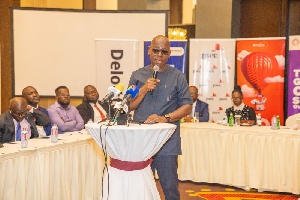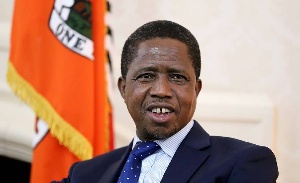- Home - News
- Elections 2024
- News Archive
- Crime & Punishment
- Politics
- Regional
- Editorial
- Health
- Ghanaians Abroad
- Tabloid
- Africa
- Religion
- Photo Archives
- Press Release
General News of Friday, 25 April 2025
Source: www.ghanawebbers.com
Africa must build, own its technology to secure its future - Margins ID Group CEO
Africa's Urgent Call for Technological Sovereignty
Global trade tensions are rising. Tariff wars and protectionism are increasing. This situation should alert Africa to act now.
Countries are becoming more nationalistic. The idea of a borderless global economy is fading fast. In this fractured world, Africa must secure its technological sovereignty immediately.
At the 2025 CEO Summit in Accra, Moses Kwesi Baiden Jnr., CEO of Margins ID Group, addressed business leaders and policymakers. He emphasized that Africa must build and own its technology.
The summit's theme was “Leading Ghana’s Economic Reset.” Baiden urged the private sector to innovate and lead Africa into the digital age on its own terms.
Baiden's message was clear: Africa cannot remain sidelined in global transformation. It must create its own digital future—where data is sovereign, systems are secure, and innovation is local. The time to build is now.
In the coming world, you either build—or you get built.
Risks of Dependence on Foreign Technology
Mr. Baiden highlighted recent disruptions in access to cloud tools and digital platforms. These disruptions reveal a significant vulnerability for African firms.
Many platforms used by African businesses are controlled by foreign entities with their interests. As global tensions rise, so does the risk of sudden disconnections from essential tools.
"Imagine losing your corporate memory overnight due to distant decisions," Baiden warned. This scenario now feels alarmingly possible.
Dependence on foreign technology poses an existential threat to Africa's future. Without action, Africa risks becoming a digital colony—bound by rules it did not create and vulnerable to unpredictable disruptions.
Engagement Is Essential
We are experiencing the Fourth Industrial Revolution driven by AI and automation. While many nations race ahead, Africa risks being left behind or defined by others.
Mr. Baiden stressed that Africa must engage boldly with these changes. “The future belongs to those who create it,” he said. “Let us set the table and shape our future.”
This requires designing transparent, ethical systems based on governance values like productivity and inclusion.
Baiden noted that private sector leadership is crucial—not just with capital but also with vision and courage. African institutions must foster homegrown innovation capable of competing globally.
Reimagining Business and Governance Roles
Africa faces challenges beyond technology; institutional reform is also needed. To build its technology, the continent must rethink governance, education, and public-private partnerships.
Mr. Baiden called on CEOs to be forces for good—not only pressuring governments but also reimagining production systems and governance frameworks for long-term change.
“The future demands transparency and effectiveness,” he stated. These values must be embedded in both public and private institutions for Africa to thrive digitally.
The Strategic Imperative for Sovereignty
In the 21st century, sovereignty will be defined by code, data, algorithms, and systems—not just borders or resources.
Digital sovereignty means self-determination for Africans in shaping global productivity systems. Mr. Baiden urged governments to design national platforms that protect citizen data while fostering local entrepreneurship.
However, he insisted that the private sector cannot remain passive in this effort. “We cannot be spectators in a future designed by others,” he warned.
Building Africa’s Future
As nations retreat behind trade barriers, Africa should not wait for aid or policy changes from global powers.
The continent's future will depend on building strong institutions, nurturing talent, and owning technologies.











